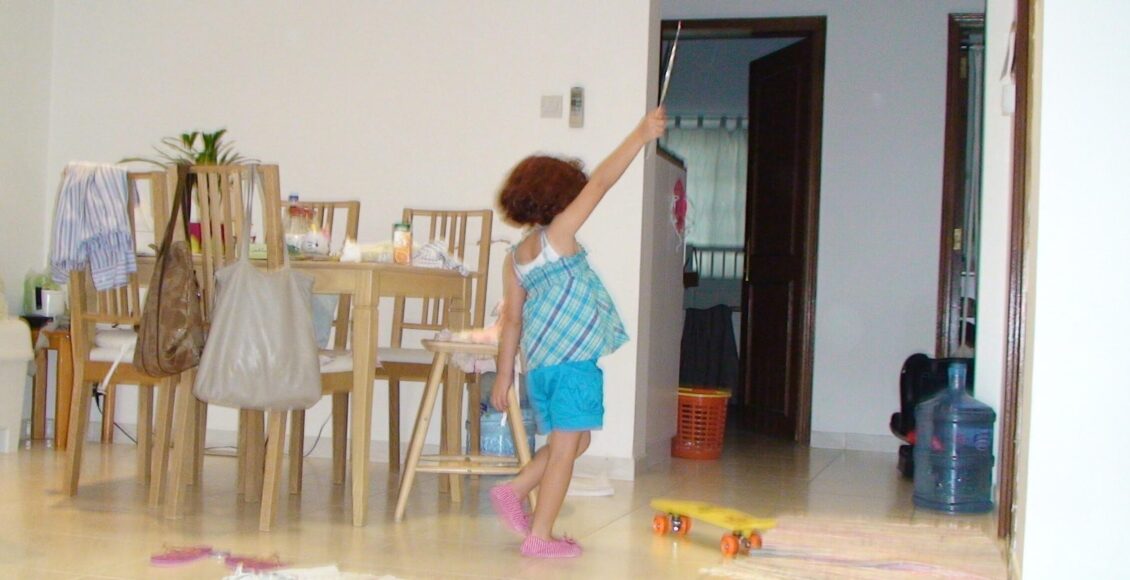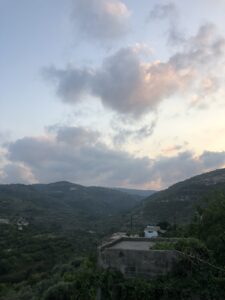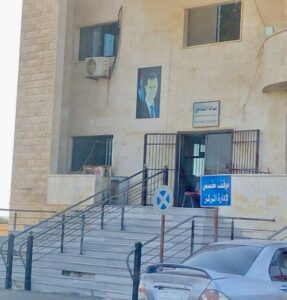Pull Down the Posters: A Brief Ba’ath Postmortem from the Syrian Diaspora
 Age 4, April 2011, chanting the slogan of the Syrian Revolution in my living room (“The people demand the state to fall!!”).
Age 4, April 2011, chanting the slogan of the Syrian Revolution in my living room (“The people demand the state to fall!!”).
For over half a century, Syria has endured authoritarian rule, large-scale conflict, and mass displacement. Rebuilding the nation after the fall of the Ba’ath regime requires not only economic development but also the preservation of history, and the strengthening of civil society.
As a diasporic Syrian, I have been privileged enough not to endure the worst of the war. However, my interactions with the regime from in and outside Syria taught me enough to understand the everyday repercussions of authoritarianism from a young age.
In 2016, the war was at such a height that when my family told people we were going to visit Syria, we received long, concerned farewells, even from my school teachers. After a brief, five-day reunion with my grandmothers in the quiet of their villages, I drove back to Lebanon with my family where we would fly back to Canada.

On our way out, the border officers ordered my mother out of the car for questioning. The border station was tall and beige, an eerie liminal space decorated only with portraits of Bashar al Assad. Immediately upon walking into the lobby, Assad’s face loomed over me from a ceiling-high mural.
The ensuing hours of questioning were the result of bureaucratic absurdity. The border’s computer system had my mother’s name on its blacklist claiming she had left Syria unlawfully without proper resignation from her job in 2013. She actually left the country over a decade prior. I was utterly hysterical with fear that she would be taken away. The officers refused the faxed proof of my mother’s resignation and increasingly insinuated that money would solve the issue. We bribed them, and they let us go.

After our return, my mum enrolled in evening classes at the local college. I regularly snuck away with the landline, certain a horde of smug Syrian officers had stopped her again, and whisper-call her from the bathroom, just to make sure she was safe.
To me, this interaction with the regime demonstrates its expertise in terrorizing the populace. A group of border officers snacking on pumpkin seeds and sipping maté had the authority to extort money and desperation from anyone in exchange for their freedom. Behind the visible war- the bombing and the chemical weaponry- a bureaucratic machine of fear commanded the lives of those within the country and outside, in the diaspora. People constantly disappeared, and their families would pore over the full morgues in search of their loved ones. The shadows on the streets concealed tall skinny men and their tall skinny rifles, dressed in the all black uniform of the shabiha, the word for Assad’s militia that originates from the term shabah, meaning ghost. There was always a possibility that being interrogated by a border or checkpoint officer could turn fatal if your name was on the wrong list.
When the Syrian refugee crisis peaked, my family began sponsoring refugees. Our circle grew as more refugees fled and settled, each marked with literal and figurative scars from the regime. Every dinner and gathering inevitably led to long mullings over the state of our country, which seemed to decay in perpetuity.
Outside of my anti-Assad community, the broader Syrian community was a politically uneasy space. My parents forbade me from openly publishing anti-regime material because Syrians outside the country could still be reported to regime informants in Syria. Reported people were blacklisted, often without their knowledge, and risked immediate arrest upon return to Syria. Fear lived in the president-praising songs my parents sang as children, in what we could write from Canada decades after they left the country, and in the photos of burns from electrocution torture in the asylum applications I helped translate.
On December 8, 2024, during my friend’s birthday party, my parents called. They asked if I had seen the news: Assad was gone. 50 years of Ba’athist military rule were over. More than a hundred thousand people remained missing, and the prisons were opened, revealing the brutal physical and psychological wounds from which so many would need to heal, as a result of the terror the country already endured.
One of the first responses I received when sharing the news was that Syria “is run by terrorists now”. The prevalent outlook towards Middle Eastern politics as unsalvageable cesspools of terrorism is immensely reductive. Hayat Tahrir al-Sham (HTS), the militia that toppled the regime, was an Islamist group. Some of its leaders who plan on participating in the new government committed violations of human rights when HTS ruled Idlib. However, those who reduce Syria to a current “terrorist state” fail to recognize the crucial nuance in the political phenomena of the region. Authoritarian regimes capitalized for decades on exploitative systems set up by colonial powers, creating an atmosphere where peaceful grassroots resistance to repression is almost always fatal. Islamist groups have emerged out of these systems as a desperate means to regain political power. They are in no way the preferred or optimal force for the betterment of the country, but rather brutal products of harsh circumstances, which are often exacerbated by foreign Western powers.
It would be naive to paint a purely optimistic picture of the current circumstances since Assad’s departure. Civil unrest between sects has taken place across the country. Hundreds of innocent Alawites have been slaughtered and attacked along the coast. Law enforcement of the new administration is attempting to intervene, although efforts to establish any official Syrian military force have been crippled by Israeli airstrikes. It is not unexpected that a state that has just witnessed a complete collapse of its government will be a politically volatile arena for revenge and unregulated violence. That does not change the ultimate objective of establishing peace and freedom from the rotting institutions left behind by the Assad regime. The hindrances to this process are not only sectarian violence, but foreign infringement on territorial rights, most notably by the Israeli military. The Syrian administration has declared it does not intend to engage in any extra-national conflict. Yet Israeli military invasions and airstrikes continue, breaking the 1974 peace agreement between Israel and Syria in blatant violation of international law.
Since its independence from France, Syria has felt the impacts of being a post-colonial state through structural adjustment programs that failed to adjust its economy for the better, and the rise of authoritarianism that infested the intellectual spaces within its society. Our collective identity was exemplified for too long by cries of “God, Syria, Bashar.” We have fled the country to uncover its truths, and to have the agency to speak our own. The people, no matter how divided, want and deserve freedom– just as they demanded in the streets of the Arab Spring. Amidst the current tumult, hope for transitional justice persists.
This current moment, wrought with revenge killings and grief, will leave its mark on Syrian history books. My hope is that it will be followed by growth; the removal of sanctions, investment in the free market and education, and the treatment of the Syrian economy and political authority by other nations as a budding teammate as opposed to an indebted beggar. There is no assurance of a stable future, but faith in its potential has persisted among the people in the face of crushing tragedies– now is not the time to let go.
Edited by Alexandra Agosta-Lyon
Featured image: Age 4, April 2011, chanting the slogan of the Syrian Revolution in my living room (“The people demand the government to fall!!”).
